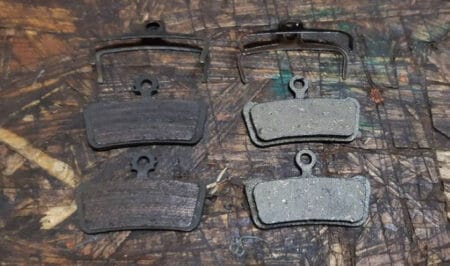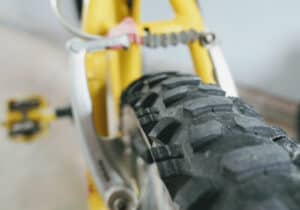
Hydraulic disc brakes can lose braking power in many different ways, and results feel a lot different from each other. My goal is to explain how you can differentiate each problem by how the brake behaves and fix it.
Before we get into real problems make sure that your brakes or brake pads are not brand new and are broke-in. Like with most new stuff there is a break-in period with hydraulic disc brakes. They are required to do up to 20 hard brakings before they stop sliding over the rotor and begin applying proper brake power.
Hydraulic Disc Brakes Are Too Soft
I see a common problem in my bike shop is people complaining their brakes lose stopping power by brake levers having a soft bite. The point where it should brake hard is actually soft on the handle, and braking power barely increases. This is showcased even more when descending because a bike requires exponentially more braking power to slow down when the gravity is working against it. It’s very dangerous because on descends most people will hold the brake all the time and the heat generated will reduce braking power even more.
Brake levers become soft due to air accumulating inside the brake system together with braking fluid. Bicycle hydraulic brakes are not closed systems. In fact, in used hydraulic brakes, the air is always present in the brake handle’s oil reservoir. Whenever the brake pads wear by a tiny bit, the pistons move out a bit to account for that wear. The reservoir oil enters the system to fill the gap while the reservoir is filled with air from outside. That air can get into the system, especially if there isn’t enough oil or the bike is held upside down.
Since the air is compressible, it will make the brake lever soft, and it needs to be extracted by a process called bleeding. Brakes with dot oil might need an oil change since dot oil absorbs water from the air. Water will dilute the oil and reduce its boiling temperature, which presents a danger when braking often.
Hydraulic Disc Brakes Are Too Loose
Hydraulic disc brakes being too loose can mean that the brake caliper is loose, but that doesn’t cause a hydraulic brake to lose its power. It only starts to rub on the rotor and make noises.
This can also mean that the brake handle has too much travel on the lever or hits the handlebar before it starts to brake properly. This is a serious problem and has several possible causes. Even though most people guess it at first, this can’t be from worn-out brake pads alone because of the way the air intake and pistons work which I explained in the previous section. There must be something else wrong with the brake.
If your brake lever hits the handlebar with a somewhat usual travel distance, it might need reach adjustment. Pretty much every hydraulic brake handle has a reach adjustment screw or knob. You can rotate it to move the lever away from the handlebar or even closer to it. Some lower-end brake levers tend to move closer and closer to a handlebar with time and need occasional readjusting.
Quite more serious is having increased travel distance on the brake lever, possibly without even reaching the bite point but simply falling through without any resistance. You can differentiate this from having air inside the system by having the same feel all the way while air tends to increase pressure but fails to produce high braking power. This could be caused by a lack of oil in the system while the reservoir intake has jammed and cannot refill the system. It could also mean that something is damaged and the system is leaking oil. Try pumping the brake lever multiple times, and if it doesn’t help, the brake should be serviced or maybe even replaced.
Hydraulic Disc Brakes Have No Pressure
Having no pressure on your hydraulic disc brakes is slightly different from the lever being too loose. This time it means that something is broken for sure, and no matter how much you move the lever away from the handlebar, it just falls through when squeezed without producing any braking power.
At this point, the oil must have left the system somewhere because it can’t disappear on its own, and the system can’t get damaged, so that it increases volume by that much without any leaks. Your first bet is to check all the moving parts on the brake, including the hydraulic hose. Especially its ends where it enters the handle or the caliper, which are usually covered with a rubber dust cover that you can pull off the nut. If the oil leak isn’t visible on any of these parts, it could be that the pistons are damaged and leaking around them. If that’s the case, your brake pads will be soaked in brake fluid, at least on the back.
Hydraulic Disc Brakes Brake Poorly With Squeaking Noises
This is kind of logical after the last problem I mentioned. It might be the most common cause of bad braking power in the bicycle industry. I can’t even tell you how many times I’ve heard the sentence, “my brakes don’t brake,” and then I look down and see the rotor being almost black from oil. Most of the time, burnt oil that people don’t even realize for what it is.
The feel is like the brake lever is holding the pressure, but brake pads are slipping on the rotor and sometimes making loud squeaking noises.
Disc brakes require proper maintenance, which can’t be avoided. A bit of carefulness around them goes a long way as well. Covering them when washing the bike and cleaning them separately is one of the most important things for an average user. Don’t copy those youtube videos where they just spray the whole bike with a pressure washer. It works only if the bike is washed after every ride and there is no oil or grease anywhere to be dispersed around the rotor.
You can check my article on disc brake maintenance for more info on this link.
Hydraulic Disc Brake Brakes Poorly With Grinding Noises
Grinding noises are quite different than squeaking. You will hear grinding noises when your brake pads are worn out to the point that there is only a metal plate left. I’ve seen people grind it all the way to pistons without realizing. You will likely lose a lot of braking power. But the problem is some brakes keep braking well enough to ignore the grinding noise until it’s too late.
However, a slight reduction in braking power is always present and grinding noises can’t mean anything good. I would advise checking your brake pads as soon as this happens.
Bad Hydraulic Brakes from the Start
Some hydraulic disc brakes are simply bad from the start. It’s hard to believe I know, but some low-end brakes are laughable. There are many brands with bad entry-level brakes and that might be the problem if your new brakes are bad even after the break-in period. Most of them are bad because of plastic pistons which is just one more example of the lowering weight insanity in bicycle industry.
I would advise checking with someone who has the same brake to see if the performance is the same.

